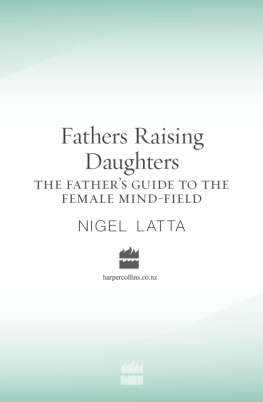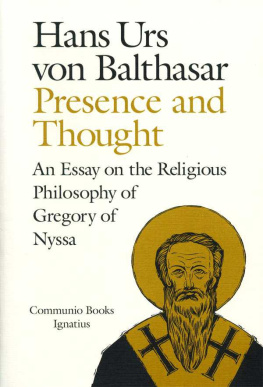A Fathers Legacy to His Daughters
To face the Title
T. Stothard delin. R. Cromek sculp. pupil of F. Bartolozzi R.A.
Religion.
Published March 1st. 1797, by Cadell and Davies Strand.
A
FATHERs LEGACY
TO
HIS DAUGHTERS.
By the late DR. GREGORY, of Edinburgh.
A NEW EDITION.
ILLUSTRATED WITH PLATES.
LONDON:
Printed for T. Cadell and W. Davies, Strand; J. Walker, and Longman, Hurst, Rees, and Orme, Paternoster Row; Vernor, Hood, and Sharpe, Poultry; Scatcherd and Letterman, Avemaria Lane; Lackington, Allen, and Co., Finsbury Square; B. Crosby, Stationers Court; J. Booker, New Bond Street; and J. Asperne, Cornhill.
1808.
Wood & Innes,
Printers, Poppins Court, Fleet Street.
PREFACE.
That the subsequent Letters were written by a tender father, in a declining state of health, for the instruction of his daughters, and not intended for the Public, is a circumstance which will recommend them to every one who considers them in the light of admonition and advice. In such domestic intercourse, no sacrifices are made to prejudices, to customs, to fashionable opinions. Paternal love, paternal care, speak their genuine sentiments, undisguised and unrestrained. A fathers zeal for his daughters improvement in whatever can make a woman amiable, with a fathers quick apprehension of the dangers that too often arise, even from the attainment of that very point, suggest his admonitions, and render him attentive to a thousand little graces and little decorums, which would escape the nicest moralist who should undertake the subject on uninterested speculation. Every faculty is on the alarm, when the objects of such tender affection are concerned.
In the writer of these Letters, paternal tenderness and vigilance were doubled, as he was at that time sole parent; death having before deprived the young ladies of their excellent mother. His own precarious state of health inspired him with the most tender solicitude for their future welfare; and though he might have concluded, that the impression made by his instruction and uniform example could never be effaced from the memory of his children, yet his anxiety for their orphan condition suggested to him this method of continuing to them those advantages.
The Editor is encouraged to offer this Treatise to the Public, by the very favourable reception which the rest of his fathers works have met with. The Comparative View of the State of Man and other Animals, and the Essay on the Office and Duties of a Physician, have been very generally read; and if he is not deceived by the partiality of his friends, he has reason to believe they have met with general approbation.
In some of those tracts the Authors object was to improve the taste and understanding of his reader; in others, to mend his heart; in others, to point out to him the proper use of philosophy, by showing its application to the duties of common life. In all his writings his chief view was the good of his fellow-creatures; and those among his friends, in whose taste and judgement he most confided, think the publication of this small work will contribute to that general design, and at the same time do honour to his memory, the Editor can no longer hesitate to comply with their advice in communicating it to the Public.
A
FATHERs LEGACY
TO
HIS DAUGHTERS.
CONTENTS.
| PAGE |
| Introduction |
| Religion |
| Conduct and Behaviour |
| Amusements |
| Friendship, Love, Marriage |
INTRODUCTION.
MY DEAR GIRLS;
You had the misfortune to be deprived of your mother, at a time of life when you were insensible of your loss, and could receive little benefit, either from her instruction, or her example.Before this comes to your hands, you will likewise have lost your father.
I have had many melancholy reflexions on the forlorn and helpless situation you must be in, if it should please God to remove me from you, before you arrive at that period of life, when you will be able to think and act for yourselves. I know mankind too well. I know their falsehood, their dissipation, their coldness to all the duties of friendship and humanity. I know the little attention paid to helpless infancy.You will meet with few friends disinterested enough to do you good offices, when you are incapable of making them any return, by contributing to their interest or their pleasure, or even to the gratification of their vanity.
I have been supported under the gloom naturally arising from these reflexions, by a reliance on the goodness of that Providence which has hitherto preserved you, and given me the most pleasing prospect of the goodness of your dispositions; and by the secret hope that your mothers virtues will entail a blessing on her children.
The anxiety I have for your happiness has made me resolve to throw together my sentiments relating to your future conduct in life. If I live for some years, you will receive them with much greater advantage, suited to your different geniuses and dispositions. If I die sooner, you must receive them in this very imperfect manner,the last proof of my affection.
You will all remember your fathers fondness, when perhaps every other circumstance relating to him is forgotten. This remembrance, I hope, will induce you to give a serious attention to the advices I am now going to leave with you.I can request this attention with the greater confidence, as my sentiments on the most interesting points that regard life and manners, were entirely correspondent to your mothers, whose judgment and taste I trusted much more than my own.
You must expect that the advices which I shall give you will be very imperfect, as there are many nameless delicacies, in female manners, of which none but a woman can judge.You will have one advantage by attending to what I am going to leave, with you; you will hear at least for once in your lives, the genuine sentiments of a man who has no interest in flattering or deceiving you.I shall throw my reflexions together without any studied order; and shall only, to avoid confusion, range them under a few general heads.
You will see, in a little Treatise of mine just published, in what an honourable point of view I have considered your sex; not as domestic drudges, or the slaves of our pleasures, but as our companions and equals; as designed to soften our hearts and polish our manners; and, as Thomson finely says,
To raise the virtues, animate the bliss,
And sweeten all the toils of human life.
I shall not repeat what I have there said on this subject, and shall only observe, that from the view I have given of your natural character and place in society, there arises a certain propriety of conduct peculiar to your sex. It is this peculiar propriety of female manners of which I intend to give you my sentiments, without touching on those general rules of conduct, by which men and women are equally bound.
While I explain to you that system of conduct which I think will tend most to your honour and happiness, I shall, at the same time, endeavour to point out those virtues and accomplishments which render you most respectable and most amiable in the eyes of my own sex.
RELIGION.
Though the duties of religion, strictly speaking, are equally binding on both sexes, yet certain differences in their natural character and education, render some vices in your sex particularly odious. The natural hardness of our hearts, and strength of our passions, inflamed by the uncontrolled licence we are too often indulged with in our youth, are apt to render our manners more dissolute, and make us less susceptible of the finer feelings of the heart. Your superior delicacy, your modesty, and the usual severity of your education, preserve you, in a great measure, from any temptation to those vices to which we are most subjected. The natural softness and sensibility of your dispositions particularly fit you for the practice of those duties where the heart is chiefly concerned. And this, along with the natural warmth of your imagination, renders you peculiarly susceptible of the feelings of devotion.










